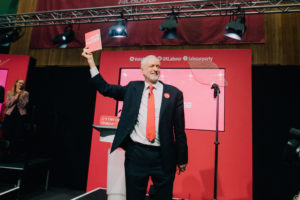by Antoine Capet (University of Rouen)
When reading the party manifestos for the forthcoming General Election, I was struck by the evolution in party thinking – at least as expressed to the voters – since the war. In my lecturing, I used to dwell on the difference between Let Us Face the Future (Labour) and Mr Churchill’s Declaration of Policy to the Electors (Conservative), the manifestos of the two main parties in 1945, not only from the obvious point of view of social and economic policy but from that of what is now called foreign and Commonwealth affairs. While the Conservative manifesto’s first three chapters were entitled ‘Britain and the world’, ‘The British Empire and Commonwealth’ and ‘Defence’, clearly indicating ‘Mr. Churchill’s’ priorities, these affairs were only discussed in the last chapter (before the general conclusion, ‘Labour’s call to all progressives’), ‘A world of progress and peace’ in Let Us Face the Future, and contrary to the Conservatives, Labour did not use the word ‘Empire’, let alone ‘Imperial ties’. Instead, it promised,
the Labour Party will seek to promote mutual understanding and cordial co-operation between the Dominions of the British Commonwealth, the advancement of India to responsible self-government, and the planned progress of our Colonial Dependencies.
In terms of word count devoted to these subjects, the situation is reversed in 2019, especially as Labour offers a special, separate ‘additional’, 18-page Race and Faith Manifesto with explicit references, not to the bright future of the Commonwealth as in 1945, but to the shameful colonial past of the country in the eyes of the two signatories of the Foreword: Jeremy Corbyn and Dawn Butler, with an insistence on two points:
The legacies of colonialism and slavery remain evident in modern day Britain, where Black and Asian people face structural racism in the economy and are hugely underrepresented in positions of power in Britain – in politics, academia and the judiciary. […]
We must not only confront these injustices but commit to address the injustices of the past. Labour will conduct an audit of the impact of Britain’s colonial legacies to understand our contribution to the dynamics of violence and insecurity across regions previously under British colonial rule. (p.6)
The section devoted to foreign, Commonwealth and defence questions in the main 2019 manifesto is called “A New Internationalism” – in perfect continuity with “A world of progress and peace”, which said in 1945:
The British, while putting their own house in order, must play the part of brave and constructive leaders in international affairs. The British Labour Movement comes to the tasks of international organisation with one great asset: it has a common bond with the working peoples of all countries, who achieved a new dignity and influence through their long struggles against Nazi tyranny.
If anything, the “common bond” is now with the former colonised peoples of the Anglosphere:
We will:
[…] Issue a formal apology for the Jallianwala Bagh massacre, and hold a public review into Britain’s role in the Amritsar massacre.
Allow the people of the Chagos Islands and their descendants the right to return to the lands from which they should never have been removed.
Uphold the human rights of the people of West Papua and recognise the rights of the people of Western Sahara.

Jeremy Corbyn at the launch of the Labour Party manifesto ahead of the 2019 General Election. Via Wikimedia Commons
In the Defence chapter, Labour also accepts the price of the colonial legacy:
We will pay a lump sum of £50,000 to each surviving British nuclear-test veteran to support them and their families with the health conditions they have suffered as a result of exposure to radiation. We will also ensure that black and Asian soldiers who fought in Britain’s colonial armies receive a full apology and explore ways to compensate them for the discriminatory demob payments they received compared to their white counterparts serving at the same rank in the same regiments.
The Conservative section, ‘We Will Strengthen Britain In The World’, begins with an attack on Labour:
As Conservatives, we are immensely proud of the UK’s history and its standing in the world. Unlike those currently leading the Labour Party, we view our country as a force for good. (p.51)
The section manages to link defence and foreign aid to the achievement of Brexit:
After Brexit, we will bolster the alliances and institutions that help project our influence and keep us safe: the UN and the UN Security Council; NATO; the Commonwealth; Five Eyes; the G20; the G7; and the World Trade Organisation.
Note how ‘the Commonwealth’ has lost its special position in Conservative world policy – it is now only one organisation among many (and I do not know how many average British voters know what ‘Five Eyes’ is – I had to look it up).
One can suppose that on the Defence page, the ex-servicemen from the former Empire and Commonwealth are covered by the following sentence – the only one that alludes to them, by contrast with Labour:
We will continue to acknowledge and commemorate the invaluable contribution of diaspora communities in previous armed conflicts. We also recognise the contribution in the present day of so many from beyond these shores, such as the Gurkhas. (p.52)
The sub-section entitled ‘Promote our values’ contains a sentence which most Labour activists would vehemently contradict (and they implicitly do so with their reference to Amritsar):
From helping to end the slave trade to tackling modern slavery, the UK has long been a beacon of freedom and human rights – and will continue to be so (p.53)
Here, we clearly have a case of plus ça change – reminding us of a proud, unrepentant ‘imperialist’ Mr Churchill in the 1945 manifesto: “Our record in colonial government is unsurpassed”, a claim which the Labour Party was careful not to take up in 1945 and which it systematically sets out to demolish in 2019.
Where does that leave us?
In 1945, the Conservatives had a long, very positive, discussion of ‘The British Empire and Commonwealth’, where Labour only had a short, almost non-committal sentence (not saying “will”, but “will seek to”) on the subject. In 2019, Labour has a very long, entirely negative discussion of how to make amends for Britain’s colonial past (and present in the painful legacy of Empire), where the Conservatives – the former “Party of Empire” – dismiss the Commonwealth with the briefest of mentions among many other organisations. We still have the same Manichean ideological approach to the ‘Colonial Question’ as in 1945 – only in reverse as far as the number of words devoted to it in either manifesto is concerned.


Recent Comments